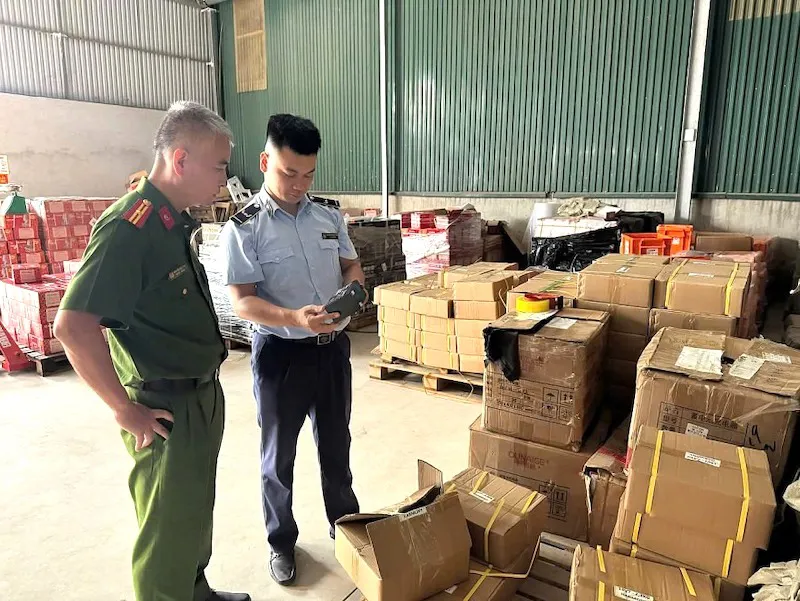Hanoi wants to set example in fight against smuggling and counterfeiting
Hanoi maintains high-intensity inspection campaigns during peak enforcement periods and conducts regular, unannounced probe.
THE HANOI TIMES — In a renewed crackdown on smuggled and counterfeit goods, Hanoi is stepping up enforcement by issuing administrative penalties and criminal referrals for serious offenses.
"The intensified approach aims to deter violations and uphold market integrity," Nguyen Kieu Oanh, Deputy Director of the Hanoi Department of Industry and Trade, said in an interview with The Vietnam Financial Times.
What is Hanoi doing to strengthen enforcement against smuggling and trade fraud as part of the national campaign?

Nguyen Kieu Oanh, Deputy Director of the Hanoi Department of Industry and Trade. Photo: vovgiaothong.vn
In response to the nationwide crackdown on smuggling, trade fraud, and intellectual property violations, the Hanoi Market Surveillance Department has launched an intensive enforcement plan. Accordingly, surveillance teams have ramped up inspections in high-risk areas such as Gia Lam, Hoai Duc, and Cau Giay.
From May 15 to May 27, Hanoi’s interagency task force, operating under the city’s 389 Steering Committee that oversees smuggling, trade fraud, and counterfeit goods, inspected 174 cases, imposed administrative fines totaling over VND2.9 billion (US$111,768), and confiscated goods worth VND3.4 billion (US$131,038).
The Hanoi Department of Industry and Trade handled 145 cases and referred two criminal cases to the police.
What are Hanoi's measures to address these violations?
Since the beginning of the year, Hanoi’s enforcement agencies have uncovered numerous serious violations involving smuggled food, cosmetics, dietary supplements, consumer goods, and electronic products. These offenses include smuggling, counterfeiting, e-commerce fraud, food safety violations, and tax evasion.
To counter these issues, authorities are targeting sellers who operate without business registration, evade taxes, and use personal bank accounts to bypass financial oversight. Many of these violators exploit e-commerce platforms and social media channels, such as Facebook, TikTok, and Zalo, disguising illegal goods in small parcels and routing them through express delivery services or temporary warehouses to avoid detection. They also rely on livestreams, flash sales, and aggressive promotions to quickly sell large volumes of unauthorized goods.
In more serious cases, such as the large-scale production of counterfeit dietary supplements, Hanoi hands the matter over to the police for criminal prosecution. Confiscated goods are destroyed, and broader investigations are launched to dismantle illegal networks and strengthen deterrence.
What is Hanoi's plan to strengthen its efforts against counterfeit and smuggled goods?

The authorities seize over 1,300 batteries without origin information from HARMONY Vietnam International Trading Co., Ltd. Photo: Hanoi Market Surveillance
Anticipating that smuggling and commercial fraud continue to be complex, the city is adopting a more comprehensive and proactive strategy to tighten market control.
The city also aims to strengthen its oversight of e-commerce platforms where goods are increasingly being counterfeited in more sophisticated ways. To this end, the city plans to use traceability technology, encoded labeling systems, and cross-sector data sharing to detect and deter violations.
Public legal awareness campaigns will be scaled up to educate both consumers and online sellers. Meanwhile, grassroots authorities are held accountable for supervising local markets to prevent counterfeit production or distribution hubs from emerging.
Hanoi is striving to set an example for Vietnam by combating smuggling, trade fraud, and counterfeit goods through coordinated enforcement and community engagement.
Thank you for your time!
|
Transparent business practices essential to stop counterfeit trade Nguyen Kieu Oanh, Deputy Director of the Hanoi Department of Industry and Trade, made three recommendations to help prevent violations. Businesses should be transparent and refuse to distribute counterfeit or untraceable goods. Companies need to boost brand protection, apply anti-counterfeit labels, and cooperate with the authorities when intellectual property violations are suspected. Consumers are advised to be smart and responsible when purchasing products, only buying from trusted sources with clear origins, labels, and security seals of products, and report the market surveillance force or police in case of suspicion. E-commerce platforms are expected to enhance their monitoring mechanisms, proactively review storefronts for violations, and remove those that violate the terms of service, along with cooperating with enforcement agencies to effectively eliminate online fraud. |












